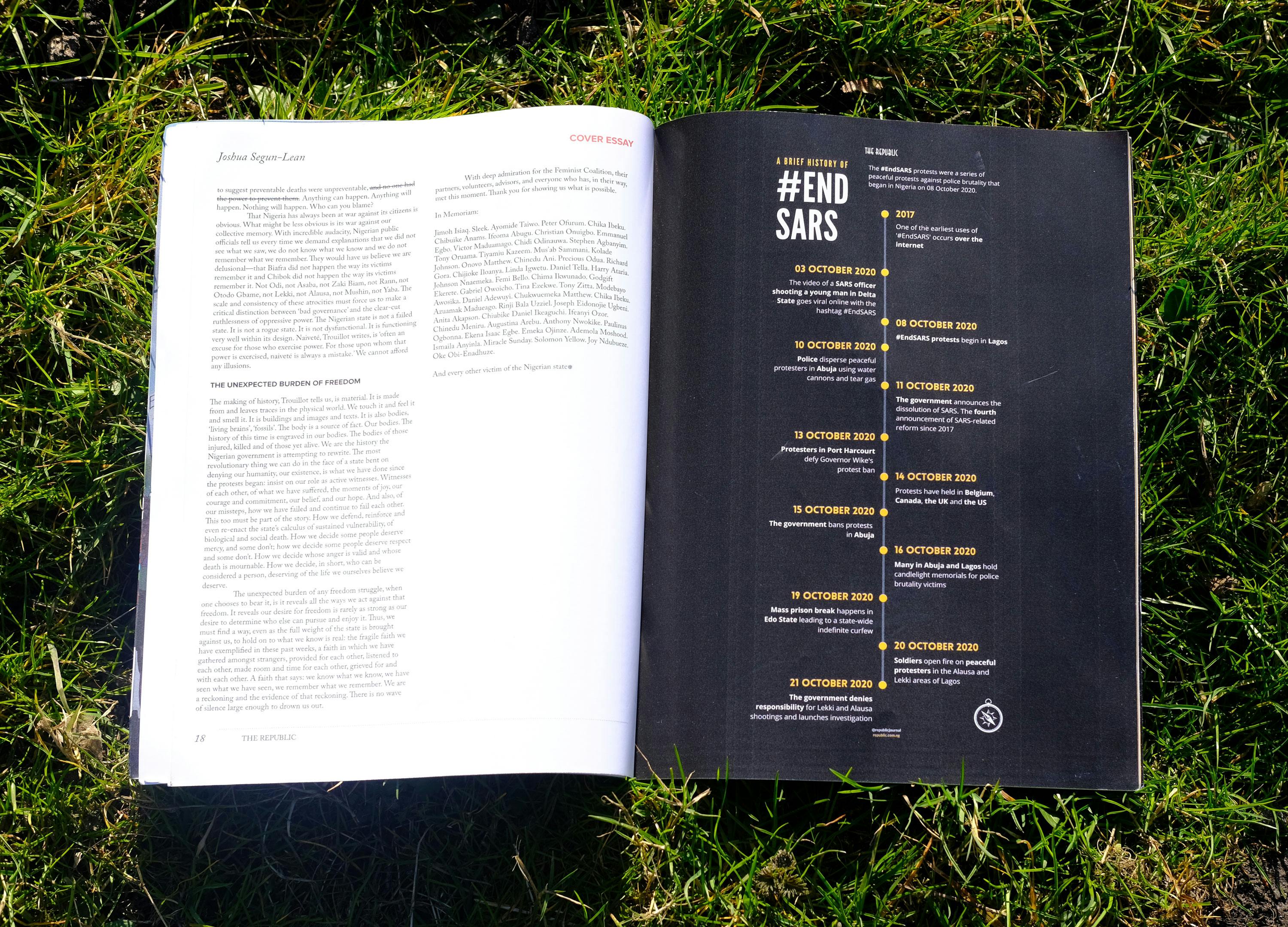Dispatch from Lagos
What does independent publishing look like outside the big hubs like London and New York? Our ‘Dispatches’ series turns to special correspondents in some of the world’s most interesting centres of independent publishing to get the view from the ground. This month, writer Afọpẹ́fólúwa Ojo reports on the magazines coming out of Lagos, Nigeria.
Lagos is the creative capital of Nigeria with a small but dynamic set of magazine-makers. Nigeria is Africa’s most populous nation, with a population of over 200 million people, more than 60% of whom are under the age of 24. Lagosians are famed for their “hustle”; a fusion of grit, passion, and striving. This native drive, as well as our youthful population, lends itself to the type of collaboration required for magazine-making.
The Civil War fought in Nigeria between 1967 and 1970 between the Igbo people in the country’s southeast region, Biafra, and the rest of the country, changed the way many Nigerians, especially the Igbos, related to their country. Over a million people died during three years of conflict, and Biafrans were starved into submission by a blockade before surrendering. Millenials like myself were not taught about this war in school. The suppression of this brutality and many others by lawmakers has made us more passionate about documentation.
This has led to a recent surge of independent magazines in Lagos created by my generation. In these magazines, there is an insistence on truth-telling, fact-finding, and archiving, so as not to repeat the mistakes of the generations before our own. Nigeria’s recent youth protests, #EndSars, against the rogue Special Anti-Robbery Squad police unit, were documented in the country’s independent magazines. Many of us have been pushed to a tipping point: we must either force a substantial change in the system, or get out before it kills us.
Below, I have collected three print magazines I believe are reshaping the indie magazine scene in Lagos. The selection is small because while the urge to create is there, independent print media is a rare thing in my city, because to print 1,000 copies of a magazine could cost over N500,000. Print magazines that manage to, against all odds, survive the austere economic situation in Nigeria, have to be rigorous with fund-raising and marketing.
It is an important time to be a millennial in my city, and these magazines highlight the creative and political power of my generation.
The Nigerian history is a violent one riddled with successful and unsuccessful coups. The name of this magazine, ‘The Republic’, is a play on the titular idea that Nigeria, which was established as a republic in 1963, should finally become a real republic and not only a representation of one. The title sets out an intention: to move towards a system without corruption that works for its people and not against them.
Founded in 2016 by Wale Lawal, this magazine cross-examines modern-day sociopolitical events and traces their trajectories from the past. Subjects include the Nigerian independence in 1960 and the Biafran war, as well as structural issues like patriarchy, misogyny, feminism, and racism, as experienced in the Nigerian mind. In the latest issue, the #EndSars protests are tackled in a series of seven essays. In an essay entitled “Anything Can Happen”, Joshua Segun-Lean writes about the “anyhowness” of the Nigerian state: “In Nigeria, anything can happen, anything will happen. Nothing will happen. Who can you blame?” Two pages in the magazine are dedicated to the timelines of the #EndSars protests and the 20 October 2020 shooting, when police opened fire on peaceful protesters and killed at least 12 people. The Republic at its core is about the kind of freedom that knowledge of the past and present can offer a people.
Buy The Republic in the Stack shop
Irin is a Yoruba word, which in English translates to “to walk” or “to go on a journey”. The Irin Journal is a travelogue of sorts. This journal is a must-have for anyone curious about what experiences the creative capital of the biggest black nation in the world has to offer its people. Founded by Ayomide Aborowa in 2019, the Irin journal was crowdfunded on Kickstarter and is now distributed internationally. Created and designed by a group of multi-disciplinary creatives and artists — Yadichinma Ukoha-Kalu, Daberechi Ukoha-Kalu, John Asuquo, and Demilade Ademuson — the journal is written in English and has a strong visual language. This is great because even Nigerians who can’t read in English can still follow the story through the beautiful design and images, and enjoy the tactile feeling of the magazine in their hands. Highlights in the inaugural issue include an essay and photographs about the difference between two types of fritter; the Nigerian akara and the Brazilian acaraje. Irin traces the roots of the fritter back to those made by the Yoruba people, who were transported over the Atlantic to Brazil as slaves.
Lagos has become the city where you come to “blow” in music. Musicians like Burna Boy, Wizkid, Naira Marley and so on, who have in recent times become global pop sensations garnered clout in the Lagos music scene. Edited by Toye Sokunbi and Edwin Okolo, The Native does well to document this community. Published in 2017, the inaugural issue comprised profiles of alternative musicians, producers and artists, and chronicled the rise of WAFFLESNCREAM, the first skateboard shop to exist in the whole of Nigeria. In my favourite feature, Burna Boy is interviewed; repeatedly says he has no friends, only brothers who would take a bullet for him. Other artists like Falana, Santi, Lady Donli, Polly Alakija, and producer Adey are photographed in a series showing what their best studio / home/ creative work clothes are. Native also hosts an annual music festival in Lagos.





















